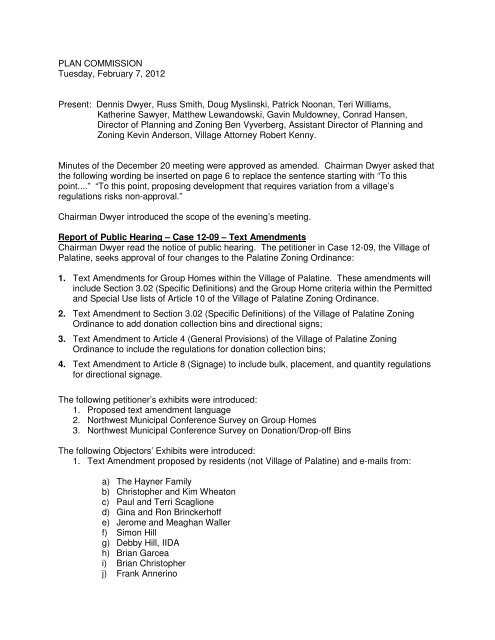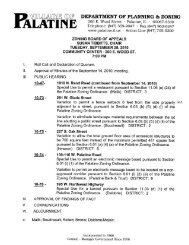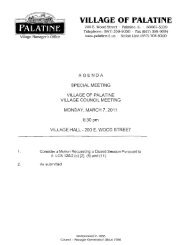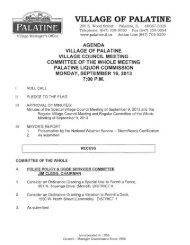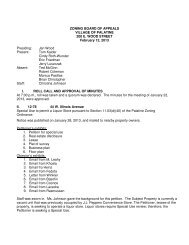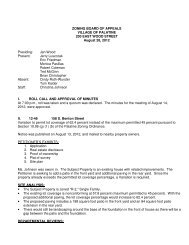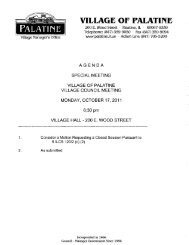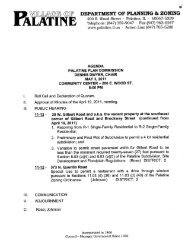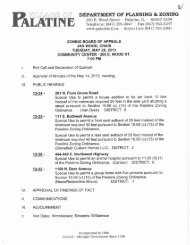PLAN COMMISSION Tuesday, February 7, 2012 ... - Village of Palatine
PLAN COMMISSION Tuesday, February 7, 2012 ... - Village of Palatine
PLAN COMMISSION Tuesday, February 7, 2012 ... - Village of Palatine
Create successful ePaper yourself
Turn your PDF publications into a flip-book with our unique Google optimized e-Paper software.
<strong>PLAN</strong> <strong>COMMISSION</strong><br />
<strong>Tuesday</strong>, <strong>February</strong> 7, <strong>2012</strong><br />
Present: Dennis Dwyer, Russ Smith, Doug Myslinski, Patrick Noonan, Teri Williams,<br />
Katherine Sawyer, Matthew Lewandowski, Gavin Muldowney, Conrad Hansen,<br />
Director <strong>of</strong> Planning and Zoning Ben Vyverberg, Assistant Director <strong>of</strong> Planning and<br />
Zoning Kevin Anderson, <strong>Village</strong> Attorney Robert Kenny.<br />
Minutes <strong>of</strong> the December 20 meeting were approved as amended. Chairman Dwyer asked that<br />
the following wording be inserted on page 6 to replace the sentence starting with “To this<br />
point....” “To this point, proposing development that requires variation from a village’s<br />
regulations risks non-approval.”<br />
Chairman Dwyer introduced the scope <strong>of</strong> the evening’s meeting.<br />
Report <strong>of</strong> Public Hearing – Case 12-09 – Text Amendments<br />
Chairman Dwyer read the notice <strong>of</strong> public hearing. The petitioner in Case 12-09, the <strong>Village</strong> <strong>of</strong><br />
<strong>Palatine</strong>, seeks approval <strong>of</strong> four changes to the <strong>Palatine</strong> Zoning Ordinance:<br />
1. Text Amendments for Group Homes within the <strong>Village</strong> <strong>of</strong> <strong>Palatine</strong>. These amendments will<br />
include Section 3.02 (Specific Definitions) and the Group Home criteria within the Permitted<br />
and Special Use lists <strong>of</strong> Article 10 <strong>of</strong> the <strong>Village</strong> <strong>of</strong> <strong>Palatine</strong> Zoning Ordinance.<br />
2. Text Amendment to Section 3.02 (Specific Definitions) <strong>of</strong> the <strong>Village</strong> <strong>of</strong> <strong>Palatine</strong> Zoning<br />
Ordinance to add donation collection bins and directional signs;<br />
3. Text Amendment to Article 4 (General Provisions) <strong>of</strong> the <strong>Village</strong> <strong>of</strong> <strong>Palatine</strong> Zoning<br />
Ordinance to include the regulations for donation collection bins;<br />
4. Text Amendment to Article 8 (Signage) to include bulk, placement, and quantity regulations<br />
for directional signage.<br />
The following petitioner’s exhibits were introduced:<br />
1. Proposed text amendment language<br />
2. Northwest Municipal Conference Survey on Group Homes<br />
3. Northwest Municipal Conference Survey on Donation/Drop-<strong>of</strong>f Bins<br />
The following Objectors’ Exhibits were introduced:<br />
1. Text Amendment proposed by residents (not <strong>Village</strong> <strong>of</strong> <strong>Palatine</strong>) and e-mails from:<br />
a) The Hayner Family<br />
b) Christopher and Kim Wheaton<br />
c) Paul and Terri Scaglione<br />
d) Gina and Ron Brinckerh<strong>of</strong>f<br />
e) Jerome and Meaghan Waller<br />
f) Simon Hill<br />
g) Debby Hill, IIDA<br />
h) Brian Garcea<br />
i) Brian Christopher<br />
j) Frank Annerino
plan commission<br />
tuesday, february 7, <strong>2012</strong><br />
page 2<br />
k) Anupama Pradhan<br />
l) Michael and Diane Schmidt<br />
2. Zoning Matrix for surrounding communities<br />
3. Joint statement <strong>of</strong> Department <strong>of</strong> Justice and Department <strong>of</strong> Housing and urban<br />
Development<br />
Ben Vyverberg suggested continuing consideration <strong>of</strong> Items #2-4 until the <strong>February</strong> 21.meeting.<br />
Staff members and Attorney Robert Kenny were sworn in.<br />
Kenny laid the groundwork for the presentation by describing procedures. He stressed that the<br />
process applies to all properties in the village and is not targeted to a specific location. Despite<br />
the high interest level <strong>of</strong> residents from a specific area, he noted that no formal application has<br />
been filed for a group home. He urged residents in attendance to be responsive to this text<br />
amendment and not focus on a specific group home.<br />
He pointed out the unique character <strong>of</strong> modifying ordinance language regarding group homes.<br />
Unlike other local zoning decisions, a federal statute has been interjected as a major factor in<br />
<strong>Palatine</strong>’s consideration <strong>of</strong> group home regulations. This is the Federal Fair Housing Act<br />
Amendments <strong>of</strong> 1988 as they apply to group homes. Noting that the federal government has in<br />
effect preempted some <strong>of</strong> the local governments’ home rule capabilities in this area, Kenny said<br />
that much litigation has arisen regarding the group home aspect <strong>of</strong> the Fair Housing Act. Local<br />
governments are now on notice they cannot adopt local ordinances and/or policies that are:<br />
1. discriminatory in purpose (intentionally seeking to prohibit group homes); or<br />
2. discriminatory in its effect (inadvertently making it impossible for a group home to locate<br />
in town); or<br />
3. which fail to make reasonable accommodations for the needs <strong>of</strong> those covered by the<br />
Fair Housing Act.<br />
What these findings mean for <strong>Palatine</strong>, Kenny said, is the village cannot regulate group homes<br />
without being subject to federal oversight and that the village needs to be aware <strong>of</strong> what courts<br />
have said about group homes as it proceeds to adopt regulations governing group homes.<br />
Kenny said the Fair Housing Act is intended to allow a handicapped person an equal<br />
opportunity to use and enjoy a single family home. The Act recognized that multiple residents<br />
are required in order to make a group home feasible and viable, both therapeutically as well as<br />
financially.<br />
The question becomes: How many people can live in a group home? Cases adjudicated and<br />
settled under the Fair Housing Act have struck down local ordinances limiting the number <strong>of</strong><br />
residents to:
plan commission<br />
tuesday, february 7, <strong>2012</strong><br />
page 3<br />
8 – recovering alcoholic – St. Louis, Mo<br />
9 – recovering alcoholic – Plainfield, NJ<br />
25 – homeless shelter residents – Caldwell, ID<br />
5 - Traumatic brain injury residents – Skokie, IL<br />
6 – Mental illness residents – Elizabeth, NJ<br />
Kenny said that according to the American Planning Association (APA), group homes for mental<br />
illness tend to house from six to 15 residents, whereas group homes for the frail elderly have up<br />
to 20 residents to be financially and therapeutically sound.<br />
Types <strong>of</strong> persons protected by the Fair Housing Act are those whose handicaps are defined by<br />
the Act as: “1) a physical or mental impairment that substantially limits one or more <strong>of</strong> a<br />
person’s major life activities; 2) a record <strong>of</strong> having such an impairment; and 3) being regarded<br />
as having such an impairment.”<br />
Two exceptions to the above definition are:<br />
1. those residents who would constitute a direct threat to the health or safety <strong>of</strong> other<br />
individuals or whose residency would result in substantial physical damage to the<br />
property <strong>of</strong> others;<br />
2. people afflicted with the current use <strong>of</strong> or addiction to a controlled substance.<br />
Therefore, those who take drugs legally or who once were but<br />
are no longer drug users are protected by the Fair Housing Act.<br />
Courts have found the following handicaps to be protected by the Fair Housing Act:<br />
1. Drug and Alcohol addiction recovery<br />
2. Emotional problems<br />
3. Mental illness and retardation<br />
4. Old age<br />
5. Communicable diseases, including AIDS and HIV<br />
6. Traumatic brain injury<br />
Kenny said many towns use the special use procedure to deal with group homes, while others<br />
impose a long list <strong>of</strong> conditions that effectively deter group homes from coming to the town.<br />
Using courts’ rulings that failure to grant a special use shows a failure on a town’s part to make<br />
reasonable accommodation to permit group homes to locate there in many respects has<br />
destroyed a town’s ability to prohibit group homes from coming to town, he said.<br />
Kenny noted that <strong>Palatine</strong> has always been welcoming to group homes. Twelve are now<br />
spread throughout the community. <strong>Palatine</strong>, however, did fight the U.S. Justice Department<br />
when a home for the recovery <strong>of</strong> alcoholic dependency decided to disregard the village’s zoning<br />
procedures and open in 1993. It was subsequently closed, apparently based on lack <strong>of</strong><br />
occupancy.
Plan commission<br />
<strong>Tuesday</strong>, february 7, <strong>2012</strong><br />
page 4<br />
Vyverberg read the definition <strong>of</strong> group home into the record. He said that <strong>Palatine</strong> currently<br />
permits group homes in all single family districts subject to the following:<br />
1. No more than eight persons, plus staff<br />
2. Licensed by the State <strong>of</strong> Illinois<br />
3. A minimum <strong>of</strong> 1,000 feet maintained between homes<br />
He said that group homes that do not meet these criteria require special use review and<br />
approval, as follows:<br />
Group homes that are not licensed or certified by the State <strong>of</strong> Illinois or are not<br />
supervised, or those whether licensed and/or supervised or not, which have nine (9) or<br />
more persons plus staff, subject to the following:<br />
10.01. A minimum distance <strong>of</strong> one thousand three hundred (1,300) feet is maintained<br />
between group homes.<br />
10.02. The group home conforms to all provisions outlined in chapter 10 <strong>of</strong> the Code <strong>of</strong><br />
Ordinances or state licensing standards, if applicable to the use.(O-92-93 8/9/93)<br />
<strong>Palatine</strong>’s planning staff proposes text amendments to the group home regulations in both the<br />
permitted and special uses to address staff and resident parking requirements and application<br />
<strong>of</strong> the relevant building, property maintenance, and fire codes. Staff also recommends<br />
expanding the scope <strong>of</strong> our definition <strong>of</strong> group homes to more clearly reflect the direction<br />
provided by the FFHA.<br />
Proposed changes to the text amendment language include regulations for on-site parking as<br />
well as bringing the definition <strong>of</strong> disability more in line with judicial findings.<br />
Vyverberg said that the village would not require a special use for those whose population is<br />
fewer than eight. Parking requirements would be governed by the lot/driveway size. Halfway<br />
houses would be a special use throughout the village, he added.<br />
He noted that staff size cannot be quantified. It depends on the population and its needs.<br />
Parking, likewise, is based on needs and number <strong>of</strong> client/staff drivers.<br />
He said that existing group homes would be grandfathered in.<br />
All persons who wished to speak to the petition were sworn in.<br />
Frank Annerino, 1195 N. Palos, said he is concerned about <strong>Palatine</strong>’s lax ways <strong>of</strong> allowing<br />
group homes and halfway houses. He characterized them as businesses that, therefore, make<br />
more pr<strong>of</strong>it with more clients. This does not match the intent <strong>of</strong> a family style environment in a<br />
single family neighborhood, he added.
plan commission<br />
tuesday, february 7, <strong>2012</strong><br />
page 5<br />
Large group homes mean overcrowding, safety issues, and lack <strong>of</strong> sufficient supervision, he<br />
charged. Residents make interior modifications in homes by cutting family rooms in half or<br />
bricking up garages to provide more bedroom space. These changes, which he described as<br />
being irreversible, would lower neighborhood property values. He feels restrictions are too lax.<br />
Eight residents plus staff in a 1,330 square foot single family home would bring the number <strong>of</strong><br />
persons to 15. This number would bring an increase in high noise level, traffic, including food<br />
delivery traffic, and on-street parking, and a lot <strong>of</strong> disruption to the neighborhood, he added. He<br />
said he would have no problem with a group home whose client population is four. He objects<br />
to larger group homes.<br />
Annerino said his research shows that according to a group home owner, the average stay in a<br />
group home is 8 months. Staff longevity is 1 year.<br />
Annerino presented proposed text amendments regarding group homes:<br />
1. Deletion <strong>of</strong> alcohol addiction as being a cause <strong>of</strong> impairment<br />
2. Change definition <strong>of</strong> family size to four or fewer. In addition, he proposed these words<br />
be added in the definition <strong>of</strong> both small and large group homes: “A group home does not<br />
include a residence that serves persons as an alternative to incarceration for a criminal<br />
<strong>of</strong>fense, or persons whose primary reason is alcohol or substance abuse, or persons<br />
whose primary reason for placement is treatment <strong>of</strong> a communicable disease.<br />
3. Deletion <strong>of</strong> Section 9.1 (pertaining again to number <strong>of</strong> clients)<br />
4. Remove Section c10 and replace it with wording governing client size; licensing or<br />
certification by the State <strong>of</strong> Illinois; maintain a minimum distance <strong>of</strong> 1,000 feet between<br />
group homes; written notification <strong>of</strong> a proposed group home be delivered to all residents<br />
within 500 feet <strong>of</strong> the property prior to special use request.<br />
Annerino said having non-licensed group homes would be unacceptable.<br />
Vyverberg said the number <strong>of</strong> clients in <strong>Palatine</strong> group homes is currently a floating number. He<br />
said staff would further review the number <strong>of</strong> police calls to group homes.<br />
Kenny said that if a person were using drugs, he would have no protection under the Fair<br />
Housing Act. Annerino’s proposed wording would not pass Fair Housing Act muster, he added.<br />
Four clients would not be sufficient for Fair Housing Act court cases, he said, noting that the Fair<br />
Housing Act treats non-related persons in a group home as a family. You can’t use the same<br />
definition for a standard family as you do for people with disabilities.<br />
He warned that the village would run into trouble if alcohol abuse were deleted from the<br />
definition.<br />
Mrs. Sawyer noted that single family homes in <strong>Palatine</strong> could have 20 related persons living in<br />
them without being regulated for numbers.
plan commission<br />
tuesday, february 7, <strong>2012</strong><br />
page 6<br />
Kenny said that if a town prohibits group homes and doesn’t get sued, it gets away with its<br />
policy. He noted that towns’ definitions <strong>of</strong> group homes are “all over the place.”<br />
Halfway houses are a different matter, he added, noting that by definition residents can be<br />
recovering drug users, those released from prison, children with behavior disorders. These are<br />
not in the purview <strong>of</strong> the Fair Housing Act.<br />
Hansen asked Annerino why he proposed removing categories from his proposed amendment.<br />
Annerino said he feels it better to keep people out <strong>of</strong> neighborhoods who have committed a<br />
crime.<br />
Susan Christopher, 1311 N. Deer, said group homes fall in different categories. Current homes<br />
are not transitional living for those in rehabilitation, she said. They have an investment in the<br />
neighborhood they’re in. She asked that <strong>Palatine</strong> consider the safety <strong>of</strong> residents in the<br />
neighborhood where group homes can be placed. “How can the village restrict the types <strong>of</strong><br />
patients and staff?” she asked.<br />
Ms. Christopher noted that high incidence <strong>of</strong> group home violence: staff on patients, being<br />
particularly bad, according to her research findings for New York City, Los Angeles, and Seattle.<br />
<strong>Palatine</strong> has a good record to date, she noted. However, she feels violence could be “just<br />
around the corner, especially as <strong>Palatine</strong> transitions from permanent residents to transitional<br />
residents.”<br />
Brian Garcea, 1401 Autumn, asked what neighboring communities are doing. Vyverberg said<br />
the Northwest Municipal Conference is the clearing house for the answers to Garcea’s question.<br />
Garcea asked <strong>Palatine</strong> to get legal opinions on this issue from other towns.<br />
He said he does not want a group home as his neighbor. “I would not have bought my house if<br />
a group home had been in the neighborhood,” he said. “We can’t get rid <strong>of</strong> them entirely,” he<br />
said, “so let’s make them as small as possible.”<br />
Danny Contimica, 1328 N. Park ave., said he built his home four years ago. He had to comply<br />
with <strong>Palatine</strong> building codes. He applauds Inverness for not allowing group homes. He doesn’t<br />
want someone in drug rehabilitation or a halfway house hurting his daughter. Parking would not<br />
be available on site for 13 cars, he asserted, so the parking will be done on street.<br />
“I don’t want <strong>Palatine</strong>’s reputation to be it allows everything in order to get the almighty dollar,”<br />
he said. He feels group homes would generate too much daytime traffic with deliveries and staff<br />
comings and goings. “This will promote havoc, chaos, and violence,” he said.<br />
Dwyer said Inverness is violating federal law. “This is not something to be proud <strong>of</strong>.”<br />
Contimica said <strong>Palatine</strong> can say it “will not tolerate riff raff in our neighborhood.”
plan commission<br />
tuesday, february 7, <strong>2012</strong><br />
page 7<br />
Dwyer said <strong>Palatine</strong> has a fine record with group homes. Problem areas cited were New York,<br />
Los Angeles, and Seattle.<br />
Dawn Wiebe, 1456 Edgewater ln., said she has a child with a disability who is growing up. She<br />
has not yet applied for her daughter to live in a group home, but that day is coming. “Who<br />
monitors the degree <strong>of</strong> impairment?” she asked. “Who checks on criminal backgrounds.”<br />
Kenny responded to a neighbor’s question about a hypothetical situation involving a case <strong>of</strong> a<br />
registered sex <strong>of</strong>fender with a traumatic brain injury. “He would probably have to register as a<br />
registered sex <strong>of</strong>fender,” he said. “But, he would be within the purview <strong>of</strong> the Fair Housing Act.<br />
The village would have to deal with decision making and background checks.”<br />
Mrs. Wiebe said she is having trouble finding facilities. If one is approved in one state, does the<br />
approval carry over to Illinois? She wants to be sure Illinois will regulate.<br />
Kenny said he would investigate Mrs. Wiebe’s questions and concerns more thoroughly.<br />
Vyverberg said staff will investigate issues raised at this public hearing, but he recommends that<br />
the plan commission approve what the village has presented here this evening. He noted that<br />
inspections <strong>of</strong> group homes are done regularly by the fire department.<br />
In conclusion, Kenny said four is not a reasonable population size given the realities <strong>of</strong> the Fair<br />
Housing Act. Eight has worked well in <strong>Palatine</strong>, he added. He said the addition <strong>of</strong> a parking<br />
requirement is a healthy thing for the impact <strong>of</strong> a group home on a neighborhood.<br />
RECOMMENDATION<br />
Hansen moved, Noonan seconded that the plan commission defer discussion <strong>of</strong><br />
1. Text Amendment to Section 3.02 (Specific Definitions) <strong>of</strong> the <strong>Village</strong> <strong>of</strong> <strong>Palatine</strong> Zoning<br />
Ordinance to add donation collection bin and directional signs;<br />
2. Text Amendment to Article 4 (General Provisions) <strong>of</strong> the <strong>Village</strong> <strong>of</strong> <strong>Palatine</strong> Zoning<br />
Ordinance to include the regulations for donation collection bins;<br />
3. Text Amendment to Article 8 (Signage) to include bulk, placement, and quantity regulations<br />
for directional signage<br />
to the <strong>February</strong> 21 meeting.<br />
Unanimously carried.<br />
(9-0)<br />
During discussion <strong>of</strong> the group home public hearing, Annerino said that the fact that eight clients<br />
is a successful number today doesn’t guarantee success in the future.<br />
Kenny said staff is not aware <strong>of</strong> any complaints about that size <strong>of</strong> group home population.
plan commission<br />
tuesday, february 7, <strong>2012</strong><br />
page 8<br />
Mrs. Sawyer said she is happy with the proposal. She was concerned that the village would<br />
allow group homes that were not licensed.<br />
Kenny responded that the Fair Housing Act provides protection to such a group home. He was<br />
asked if <strong>Palatine</strong> is being too onerous in its restriction. Kenny said the village would have to talk<br />
to the state to find examples <strong>of</strong> non-licensed group homes. He noted that the key words, “not<br />
licensed by the state” could be the basis for requiring a special use permit in order to provide<br />
the protections that State licensing would otherwise protect.<br />
Mrs. Sawyer asked if a home is not licensed, why not?<br />
Kenny said he will check on the licensing/non-licensing issue.<br />
Dwyer outlined the following issues raised at this public hearing that plan commissioners will be<br />
considering in its deliberations and voting:<br />
1. Number <strong>of</strong> clients (group home population)<br />
2. What is desired v. what the law requires.<br />
3. Prohibiting residents from being recovering alcoholics.<br />
4. Eliminating half way houses.<br />
5. Wording issues.<br />
6. Amount <strong>of</strong> licensing required.<br />
Annerino asked the plan commission to make a recommendation this evening to speed the<br />
process <strong>of</strong> consideration by the village council.<br />
RECOMMENDATION<br />
Hansen moved, Mrs. Williams seconded that the plan commission continue the public hearing<br />
on Case 12-09 until <strong>February</strong> 21.<br />
Unanimously carried.<br />
(9-0)<br />
After communications, the meeting was adjourned at 10:00 p.m.<br />
Natalie Meyer McKenzie<br />
secretary


